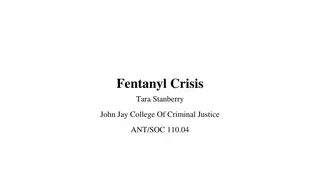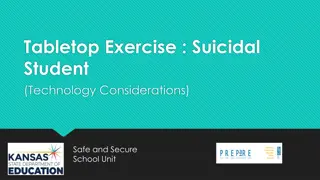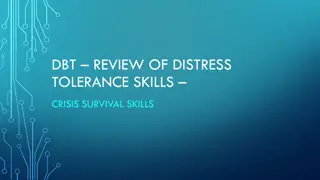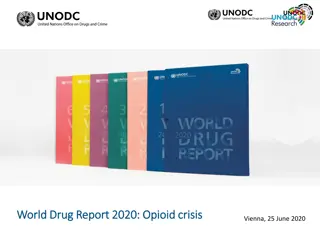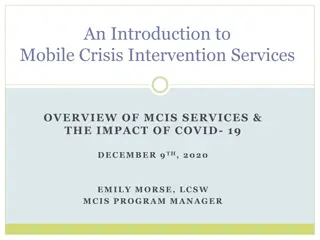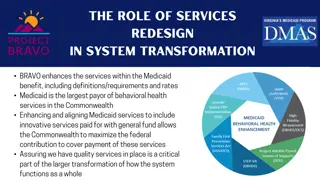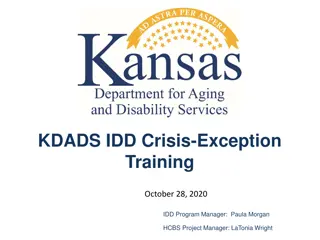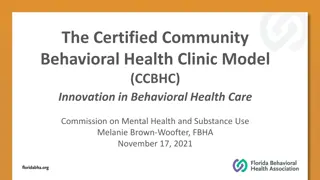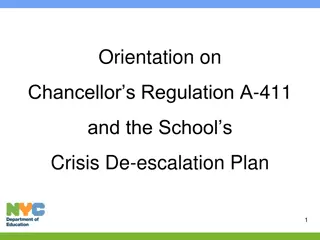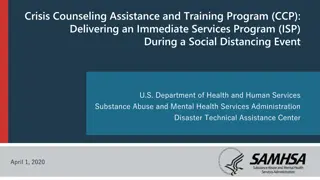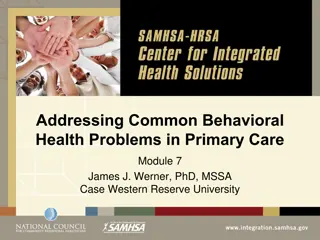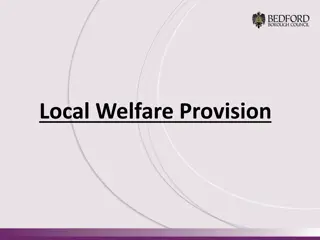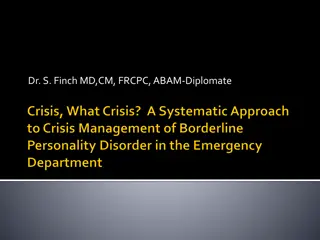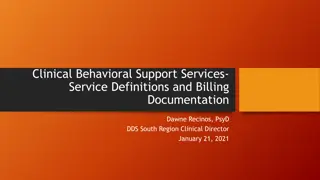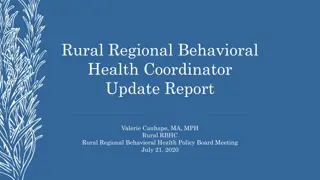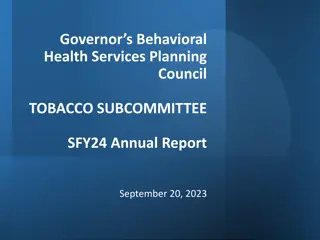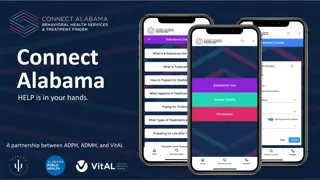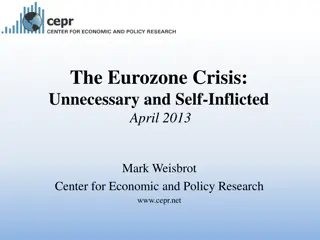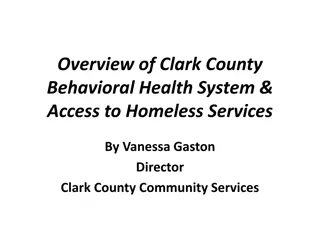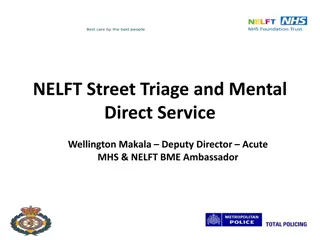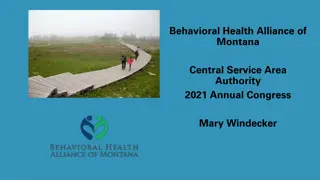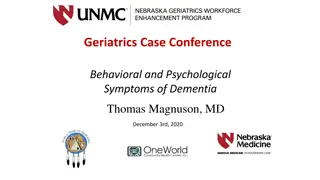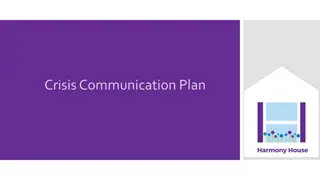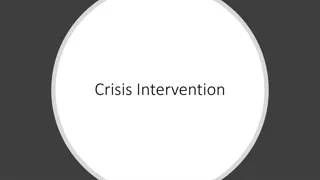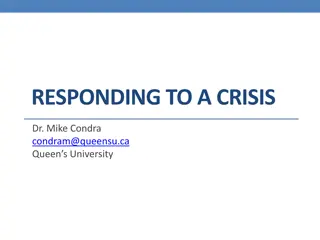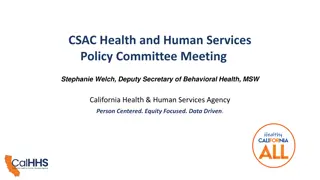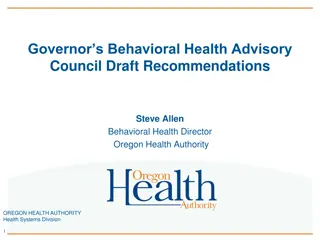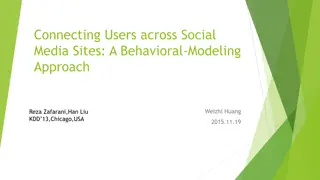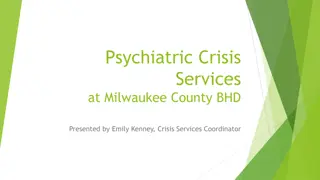Understanding the Fentanyl Crisis: Impacts and Adaptations
The fentanyl crisis, a significant aspect of the opioid epidemic, has led to a surge in overdose deaths, with devastating effects on various demographics. This crisis has prompted shifts in drug policies, healthcare responses, and user behaviors to address the dangers posed by fentanyl-laced substan
0 views • 6 slides
Crisis Management in Organizational Context: Understanding, Planning, and Response
Crisis management is essential for organizations to navigate unexpected and high-risk situations effectively. A crisis is a time of intense difficulty or danger that requires strategic decision-making and communication under pressure. The phases of crisis management include pre-crisis prevention, pr
1 views • 37 slides
School Crisis Management in the Digital Age
Addressing a school crisis involving a suicidal student through a tabletop exercise reveals the importance of adapting to technology considerations. From identifying warning signs, involving law enforcement, managing rumors, to leveraging virtual crisis rooms, the crisis team navigates challenges in
0 views • 9 slides
DBT Review of Distress Tolerance Skills & Crisis Survival Techniques
Explore DBT review of distress tolerance skills and crisis survival tactics including STOP method, pros/cons evaluation, crisis urge management, TIP technique and Wise Mind principles. Learn when to apply crisis survival skills and how they can aid in managing short-term crises effectively.
1 views • 15 slides
Overview of Opioid Crisis in North America and Africa
The opioid crisis in North America and Africa presents common threats and differing dynamics. Factors such as ease of manufacturing, interchangeability of fentanyl and tramadol, and market dynamics contribute to the crisis. In North America, high rates of prescription opioids have led to diversion a
1 views • 26 slides
Overview of Mobile Crisis Intervention Services and the Impact of COVID-19
Mobile Crisis Intervention Services (MCIS) in Connecticut provides crisis stabilization and hospital diversion for youth experiencing behavioral and mental health crises. Available for ages 0-17 and 18-year-olds in high school, MCIS offers intervention, referrals, and support to prevent future crise
0 views • 17 slides
Overview of Bravo Services and Behavioral Health Initiatives in Virginia
The details provided highlight Bravo services in Virginia, focusing on mobile crisis response, community treatment, and crisis stabilization units. Challenges include limited training funds impacting workforce preparation, hindering service expansion. Successful partnerships, implementations, and th
0 views • 5 slides
KDADS IDD Crisis Exception Training Overview
This document provides an overview of the KDADS IDD Crisis Exception Training held on October 28, 2020. It includes information on the agenda, purpose of the training, review of the current process, and policies related to crisis exceptions in IDD programs. The training aimed to streamline the crisi
1 views • 16 slides
Water Crisis in Jordan: Causes, Consequences, and Solutions
The water crisis in Jordan is primarily due to water shortage, with the Jordan River running nearly dry. This crisis has severe consequences, including rapidly decreasing water resources, leading to a water stress crisis. However, solutions such as reservoirs, rainwater harvesting, and water conserv
2 views • 7 slides
Comprehensive Overview of the Certified Community Behavioral Health Clinic (CCBHC) Model
The Certified Community Behavioral Health Clinic (CCBHC) Model is an innovative approach to improving and expanding behavioral health care by focusing on outcomes and prospective payments. It involves meeting stringent criteria, receiving funding for services, and ensuring access to integrated care.
0 views • 14 slides
School Crisis De-escalation Strategies and Plans
Schools in New York City are committed to maintaining safe and orderly environments for effective teaching and learning. Establishing Crisis Intervention Teams and completing Crisis De-escalation Plans are essential. De-escalation strategies involve identifying crises, assessing strengths and weakne
0 views • 31 slides
Crisis Counseling Assistance and Training Program (CCP) Overview
The Crisis Counseling Assistance and Training Program (CCP) offers short-term disaster relief grants to states, U.S. territories, and federally recognized tribes. CCP grants support community-based outreach by training local individuals to provide services such as crisis counseling and emotional dis
0 views • 26 slides
Behavioral Health in Primary Care: Understanding and Addressing Common Problems
Patients visiting primary care often present with physical symptoms that lack clear biological causes, indicating the importance of considering behavioral factors. Up to 70% of primary care visits are related to behavioral health needs, stressing the significance of addressing unhealthy lifestyle be
0 views • 40 slides
Understanding Behavioral Finance in "Finance for Normal People
Delve into the world of behavioral finance as presented in "Finance for Normal People," exploring how investors and markets behave based on cognitive and emotional factors. The book covers topics such as cognitive shortcuts and errors, emotional biases, and correcting investment mistakes. It also di
0 views • 20 slides
Local Welfare Provision - Assistance for Crisis Situations
Bedford Borough Council introduced the Local Welfare Provision to offer Crisis Grants and Home in the Community Grants to residents experiencing unforeseen crisis or hardship. Crisis Grants support immediate health and safety risks arising from disasters, with assistance such as energy top-up vouche
1 views • 11 slides
Understanding Borderline Personality Disorder (BPD) Crisis Presentations
Borderline Personality Disorder (BPD) is a common and challenging disorder, especially in clinical populations. With prevalence varying from 1-2% in the general population to up to 25% in agitated emergency patients, BPD often presents in crisis situations, leading to suicidal behavior and frequent
1 views • 41 slides
Clinical Behavioral Support Services: Definitions and Guidelines
Clinical Behavioral Support Services are therapeutic interventions aimed at enhancing individuals' independence and community inclusion. These services involve creating positive behavioral support plans, assessing behavioral needs, providing appropriate training, evaluating plan effectiveness, and e
0 views • 11 slides
Enhancing Mental Health Crisis Response in Waterloo Region
The Waterloo Region Specialized Crisis Team Project aims to improve the response to individuals in mental health crisis by strengthening collaboration between police, community mental health, and acute mental health services. Through strategic partnerships and funding, the project has implemented me
0 views • 30 slides
Rural Regional Behavioral Health Coordinator Update Report
Valerie Cauhape, MA, MPH, presents updates from the Rural Regional Behavioral Health Policy Board Meeting on July 21, 2020. The report highlights increased demand for behavioral health services, challenges in accessing inpatient providers, and initiatives for Behavioral Health Task Force implementat
1 views • 16 slides
Odwalla's Renewal Strategies in the E. coli Apple Juice Crisis
Analyzing Odwalla's discourse and strategic responses during the E. coli apple juice crisis, from the pre-crisis phase to post-crisis innovative solutions. The crisis management timeline includes key events such as the FDA investigation, voluntary recall, corrective actions, and strategic planning t
0 views • 20 slides
Governor's Behavioral Health Services Planning Council Tobacco Subcommittee Report
Tobacco remains a significant risk factor for individuals with behavioral health conditions, with high smoking rates among this population. The Governor's Behavioral Health Services Planning Council Tobacco Subcommittee aims to promote a tobacco-free lifestyle and enhance recovery by addressing toba
0 views • 17 slides
Connect Alabama: Helping Hands in Addressing Behavioral Health Crisis
Alabama is facing a rising behavioral health crisis, with increasing substance and opioid use disorder cases and mental illness since the pandemic. Learn about Connect Alabama, a partnership between ADPH, ADMH, and VitAL, aimed at providing support and resources to those in need. Discover why Connec
0 views • 8 slides
Understanding the Eurozone Crisis: A Critical Analysis
The Eurozone crisis of April 2013 was deemed unnecessary and self-inflicted by Mark Weisbrot. Contrary to conventional wisdom, the crisis was not solely a debt crisis but also a result of the world financial crisis and recession. Countries like Spain and Ireland, which were reducing their Debt/GDP r
0 views • 51 slides
Overview of Clark County Behavioral Health System and Access to Homeless Services
In Clark County, the Behavioral Health System provides a comprehensive range of services for individuals in crisis, including crisis assessment, referral to outpatient providers, day treatment programs, crisis stabilization, and inpatient psychiatric treatment. The system also offers services for ho
0 views • 8 slides
Understanding Warm Lines: A Vital Support System Beyond Crisis Intervention
In the realm of mental health support, warm lines serve as invaluable resources beyond crisis intervention hotlines. Originating in the late 1950s, these lines cater to individuals facing non-crisis challenges such as depression, loneliness, and relationship issues. Project Return Peer Support Netwo
0 views • 27 slides
Improving Mental Health Crisis Care with NELFT Street Triage Service
NELFT's Street Triage service, led by Deputy Director Wellington Makala, collaborates with police and mental health professionals to provide on-the-spot advice for individuals facing mental health crises. The Crisis Care Concordat emphasizes the importance of joint working between various services t
0 views • 21 slides
Organizing in Times of Crisis: Strategies for Managing the Unexpected
Explore the innovative strategies proposed by Prof. Dr. Daniel Geiger on organizing in times of crisis, focusing on preparing organizations to effectively deal with unexpected events like the COVID-19 pandemic. The content delves into the phases of crisis unfolding, managing the tension between stab
0 views • 13 slides
Understanding Behavioral Finance and Technical Analysis
Behavioral finance explores irrational behaviors in decision-making processes in finance, highlighting the limitations of rationality assumptions. It delves into information processing problems and behavioral biases that can distort market prices. The consistency between technical analysis and behav
0 views • 43 slides
Pathways to Excellence Behavioral Health Steering Committee Meeting Overview
The Pathways to Excellence (PTE) Behavioral Health Steering Committee Meeting held on February 17, 2015, reviewed the roles of various organizations, discussed the steering committee membership, and established domains of quality in behavioral health. The meeting focused on reporting meaningful beha
0 views • 16 slides
Behavioral Health Alliance of Montana: Advocating for Behavioral Health Providers and Clients
Formed in 2017 by the Montana Healthcare Foundation, the Behavioral Health Alliance of Montana serves as a unified voice for advocacy on behalf of behavioral health providers and clients in the Central Service Area Authority. With a focus on supporting adult and children's mental health, substance u
0 views • 18 slides
Integrated Behavioral Health Initiative for PHN Practices
The Behavioral Health Initiative (BHI) aims to develop a comprehensive strategy to address mental and behavioral health needs in the PHN regional practice network. It offers training, education, and partnership opportunities for PHN members, including free webinars, office hours, and a yearlong Qual
0 views • 4 slides
Understanding Behavioral Symptoms of Dementia in Geriatric Patients
This informational content discusses the various behavioral and psychological symptoms of dementia (BPSD) in geriatric patients, including common symptoms like depression, aggression, anxiety, and apathy. It highlights the prevalence of behavioral issues in dementia patients, their impact on caregiv
0 views • 15 slides
Crisis Communication Plan and Team Overview
Crisis communication plans are essential for organizations to effectively communicate with stakeholders during a crisis. This detailed plan outlines key steps, important contacts, and the roles of the crisis management team. It emphasizes the importance of evaluating each crisis situation individual
0 views • 11 slides
Crisis Intervention and Trauma Support Overview
Crisis intervention aims to provide immediate assistance to individuals facing overwhelming situations, helping them cope with mental, physical, emotional, and behavioral distress. Traumatic experiences can disrupt a person's sense of control, connection, and meaning-making. The goals include reduci
0 views • 17 slides
Understanding and Dealing with Crisis: A Comprehensive Guide
Crisis can leave individuals feeling overwhelmed, helpless, and unable to cope, affecting their emotions, thoughts, and behaviors. Recognizing the signs of a crisis and understanding the components involved can help in effectively managing and responding to such situations. This guide explores the d
0 views • 15 slides
Transforming California's Behavioral Health Care System for Comprehensive Support
California's Health and Human Services Agency is dedicated to transforming the behavioral health care system to ensure all Californians have access to high-quality care. This transformative effort includes addressing capacity challenges, enhancing crisis services, providing more community-based opti
0 views • 19 slides
Crisis Communication in Africa: Strategies and Response
Explore the key principles of crisis communication in Africa through expert insights and quotes. Learn about crisis response strategies, the importance of accurate information dissemination, and steps for effective crisis management. Discover the significance of the "Golden Hour" and surviving the i
0 views • 29 slides
Oregon Health Authority's Behavioral Health Advisory Council Recommendations
Oregon Health Authority's Behavioral Health Advisory Council (GBHAC) is focused on improving access to effective behavioral health services for adults and transitional-aged youth with mental illness and substance use disorders. The council's recommendations aim to advance health equity, early detect
0 views • 17 slides
Behavioral Modeling Approach Across Social Media Sites
This paper explores a behavioral modeling approach for connecting users across social media sites, aiming to identify individuals based on their shared information and unique behavioral patterns. It addresses the importance of verifying ages online and presents a methodology called MOBIUS for user i
0 views • 29 slides
Psychiatric Crisis Services Overview in Milwaukee County
Crisis Services in Milwaukee County Behavioral Health Division (BHD) provides comprehensive mental health emergency support through various programs, including Psychiatric Crisis Services (PCS/OBS). Available 24/7, PCS serves individuals facing acute mental health emergencies, providing triage, asse
0 views • 15 slides
